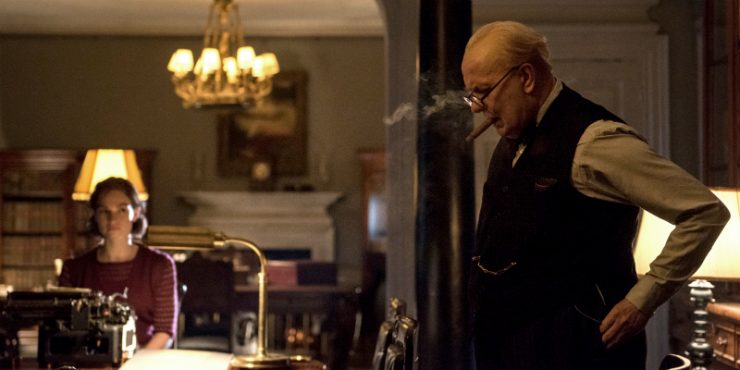Darkest Hour is a holdover from a previous time. A very traditional biopic that praises all of the things that the movies couldn’t stop praising in, say 1997. As a Churchill biopic, it is far from startling. Churchill was a man whose charisma was so large and all-encompassing that his every public step and comment made him feel like a movie character. Darkest Hour tries to perform a balancing at: humanizing the man while lionizing the mythology. The film feels every bit as balanced as Churchill himself after his morning scotch.
Churchill is played by Gary Oldman, a much-respected veteran actor who seems well on his way to winning his first Oscar for this part. Oldman is an impeccably skilled performer, who is as loved for his eccentric approach to odd characters as he is for soft, subtle gestures he creates to make those characters feel real. His Churchill is all bluster and all jowls. Of course, the character comes with good lines, and Oldman can deliver them, but I never really got a sense of Churchill as a human being. In a face transformed by make-up and a body puffed up under layers of costuming, Oldman is taking the most conservative road toward awards season glory, and people seem to be eating it up.
Darkest Hour‘s script (by Anthony McCarten) is a tired affair that concerns itself with the troubled beginnings of Churchill’s first run as England’s prime minister. With Hitler’s growing influence, the British parliament has forced out Neville Chamberlain (Ronald Pickup) for his seeming tepidness in the face of oncoming war. All cabinet members, as well as His Majesty King George (played with lisp-y precision by Ben Mendelsohn), would like to see Edward Wood, Earl of Halifax (Stephen Dillane) succeed Chamberlain. But they know there is only one man who would get the support of each party: Winston Churchill.
Churchill’s war hawk politics fly in the face of Chamberlain and Halifax’s plans to barter peace with Hitler, but the people seem to be on the prime minister’s side. The byzantine nature of British politics is so that survival within the parliament seems to supersede the approval of the constituency. Churchill seems to have little support from his own cabinet, outside his second-in-command Anthony Eden (Samuel West) and his new secretary, Elizabeth (Lily James). At home, Churchill’s wife Clementine (Kristen Scott-Thomas, in what is easily the film’s best performance) supports him endlessly, while constantly worrying what the strain of public office will unleash on her husband in his advanced age.
Darkest Hour would make a very interesting double feature with Christopher Nolan’s Dunkirk if you conveniently ignore that Darkest Hour champions the very mythologizing that Dunkirk works so hard to disprove. Both films document the same conflict from opposite ends of the English Channel, but Nolan was interested in the collective achievement of survival, while Darkest Hour director Joe Wright seems content in giving the credit to one man. I’m not unilaterally opposed to this kind of storytelling, but it doesn’t help that Darkest Hour also feels interminable, and despite Wright’s best efforts to excite the audience with roaming, showy camerawork, he’s still basically telling a two-hour-plus story of people in a room monologuing.
Darkest Hour simply brings nothing new to the table, and one struggles to figure out the use of this film at this moment. Dunkirk told the tale of this conflict in a much more compelling fashion, and the bureaucracy of Twentieth Century British politics is widely more interesting within Netflix’s series The Crown (which also has a much more interesting portrayal of Churchill). The movie has grown into a sizable hit since its release two months ago, and that probably speaks to the dependable audience for more traditional biopic/WWII combination films. I must confess that this genre does little for me, and Darkest Hour is no exception.
Directed by Joe Wright










